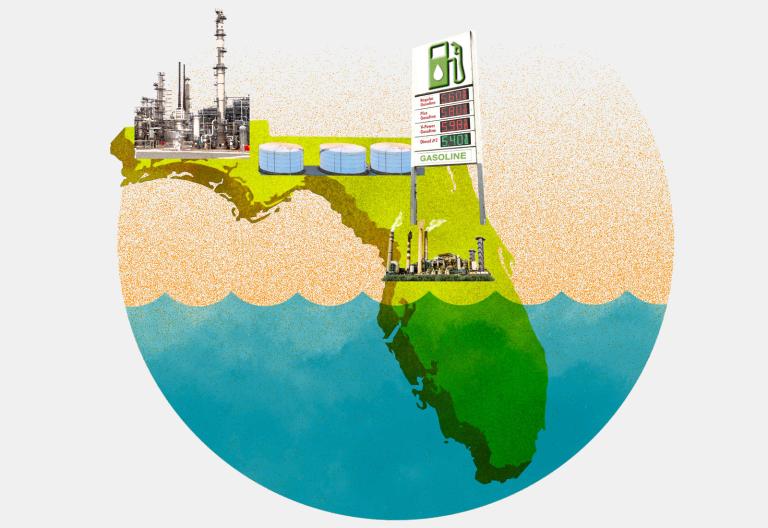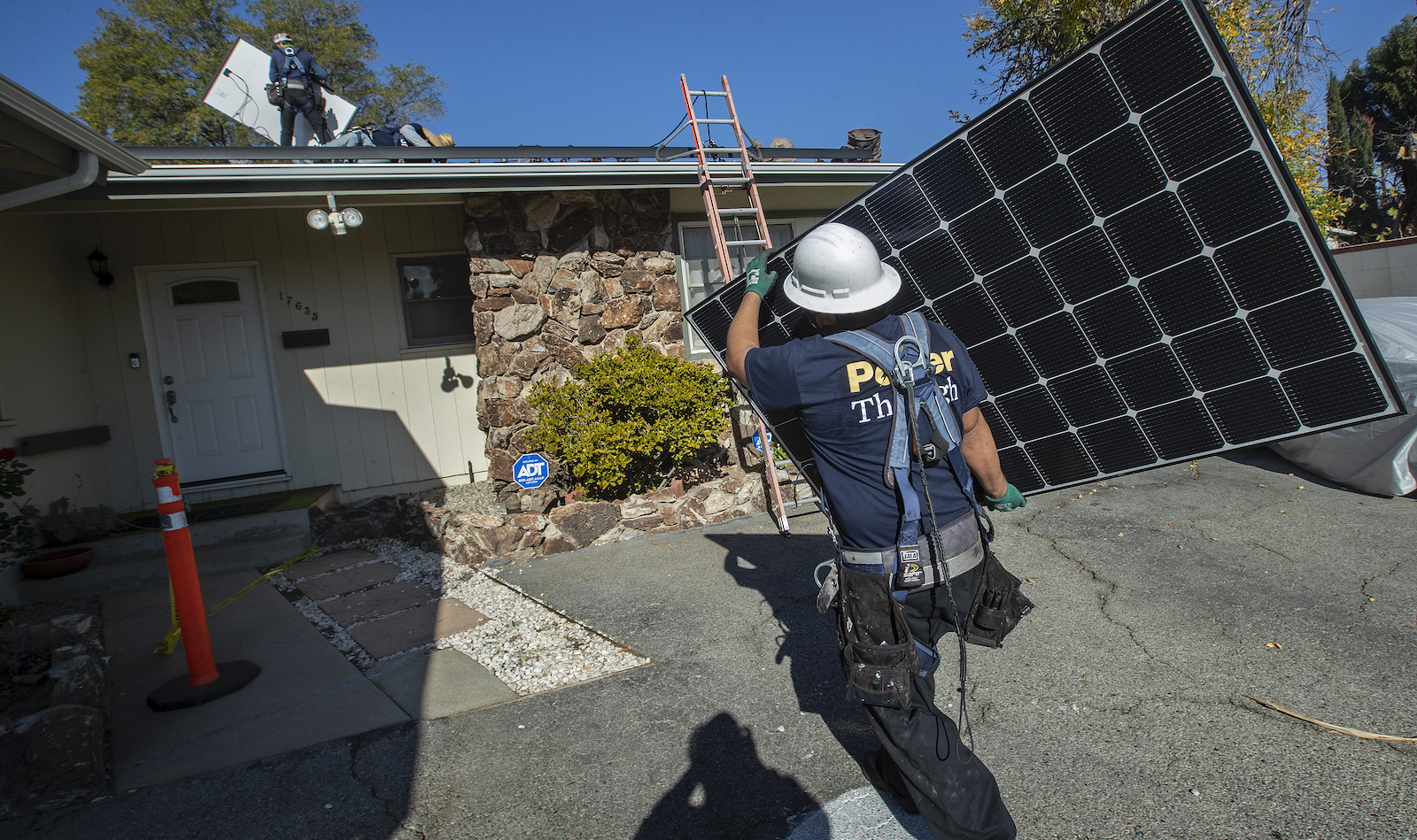If you look at state-level action on climate change in the United States, Texas might seem like an immovable elephant. It has the highest greenhouse gas footprint in the country, emitting twice as much as California, which has 10 million more people. Between oil and gas extraction, refining, and petrochemical production, the fossil fuel industry in Texas employs about 450,000 people, according to Bureau of Labor Statistics data, and has significant political sway. The state’s Republican-controlled legislature has barely acknowledged that climate change exists, let alone passed laws that would help fight it — to the contrary, it recently passed laws to fend off attacks on fossil fuels.
But those facts belie notable shifts underway in the state’s economy and culture. Texas has built more wind power than any other U.S. state. Its biggest cities, Houston, San Antonio, Dallas, and Austin, all have climate action plans that aim to reduce emissions to net-zero by mid-century. Recent research has shown that the oil and gas industry no longer drives economic growth in the state. And Texas oil and gas workers — who are often cast as obstacles to climate action — have started to come to terms with the idea that the energy transition is underway.
On Wednesday, dozens of unions attending the Texas AFL-CIO’s annual convention, including those with members employed in the oil and gas industry, voted to endorse a series of recommendations for Texas to reduce emissions while creating good-paying jobs and ensuring fossil fuel workers aren’t left behind.
“We get these narratives that the fossil fuel unions are against climate action,” said Mijin Cha, a professor at Occidental College who researches just transitions and worked on the Texas recommendations. “I think it’s a lot more complicated than what we hear.”
The recommendations were developed by the Texas Climate Jobs Project, a new offshoot of the Texas AFL-CIO, in collaboration with researchers from Cornell University’s Worker Institute and in consultation with 27 Texas unions from a range of industries. They aim to cut carbon from almost every part of Texas’ economy, proposing ambitious targets to build wind and solar farms and geothermal power plants, upgrade the state’s transmission grid, reduce energy consumption in buildings, install solar panels on schools, extend broadband internet access, expand high-speed rail, and electrify school buses and government-owned vehicles.
For Texas’ vast industrial sector, which is responsible for 42 percent of the state’s energy-related emissions and is much harder to clean up, the report recommends that the state do more to support the development of technologies to capture carbon from smokestacks as well as directly from the air.
These are key ingredients in many climate plans, but the report goes further, adding job creation estimates for each recommendation and describing how labor leaders can use these targets as opportunities to fight for good-paying, union jobs.
For example, a “Buy Texas” program for electric school buses and government-owned vehicles could spur local manufacturing of electric vehicles and create 3,401 jobs. Building out the required electric vehicle charging infrastructure to support those vehicles could create 1,307 jobs in construction and electrical line upgrades. The report suggests that unions could develop a national standard or certification for electric vehicle charging station installation and maintenance, ensuring these jobs are filled with skilled union labor. Taken together, the recommendations in the report would create an estimated 1.1 million jobs directly over the next 25 years, and an additional 2 million jobs indirectly.
Lara Skinner, the director of the climate and labor program at Cornell’s Worker Institute, which conducted the research for the report, said these kinds of analyses are frequently missing from climate conversations. “There’s been a real focus on the carbon impact of proposals,” she said, “and not enough emphasis on what type of jobs are these activities going to create, what are the quality of these jobs, are they actually going to help reverse inequality.”
Only 4.8 percent of Texas workers belonged to unions in 2020, which is half the national average of 10.7 percent. While proponents of clean energy often paint the energy transition as a huge opportunity to create jobs, so far most of those jobs have not been unionized. Skinner said that across the country, fossil fuel power plants have about a 20 percent unionization rate, whereas wind farms have a 6 percent unionization rate and solar power plants only 3 percent.
But in some states, unions have made inroads into clean energy. Skinner worked with unions in New York state on a similar climate jobs report after Hurricane Sandy. The campaign that came out of it successfully lobbied for a state target of 9 gigawatts of offshore wind and prevailing wage and project labor agreement requirements for renewable energy projects of a certain size.
Wayne Lord, who consulted on the Texas report, is the business manager for Plumbers Local Union 68, which is part of a larger union that represents pipefitters who work on pipelines. He said his members understand the transition is coming and needed. “We’ve had extremely rough hurricanes, then we turn right around and we have a freeze that crippled the whole state. We know something’s got to be done,” he said. Lord said he sees new opportunities for plumbers in water efficiency upgrades, installing new energy-efficient heating, cooling, and ventilation systems, and installing systems to clean the dust off of solar panels. Pipefitters could find work on new pipelines that carry carbon dioxide captured from the smokestacks of industrial plants to places where it can be stored underground.
Lord said just because unions are backing these recommendations doesn’t mean there won’t still be tensions with environmental groups around fossil fuel projects. He said he doesn’t see traditional energy sources ever fully going away.
Lee Medley, former president of the United Steelworkers Local 13-1, who also consulted on the recommendations, agreed that fossil fuel jobs will not go away entirely because he believes oil and gas will continue to be used to make plastic. But he wants to make sure that as some of his members’ jobs go away, they are retrained for jobs that pay just as well.
“There’s a lot of claims of a lot of jobs, but nothing guarantees them as union jobs or well-paying jobs,” he said. Medley said he’s skeptical about the estimates of how many jobs these various recommendations will create. “But at the same time, if I’m not involved, I won’t be able to affect those numbers,” he said.
The AFL-CIO vote was just a first step. Bo Delp, executive director of the Texas Climate Jobs Project, said it’s his job now to take these recommendations and turn them into a reality. “The next steps are to work with many of these labor unions that have provided feedback on this report to help make that happen,” he said.




